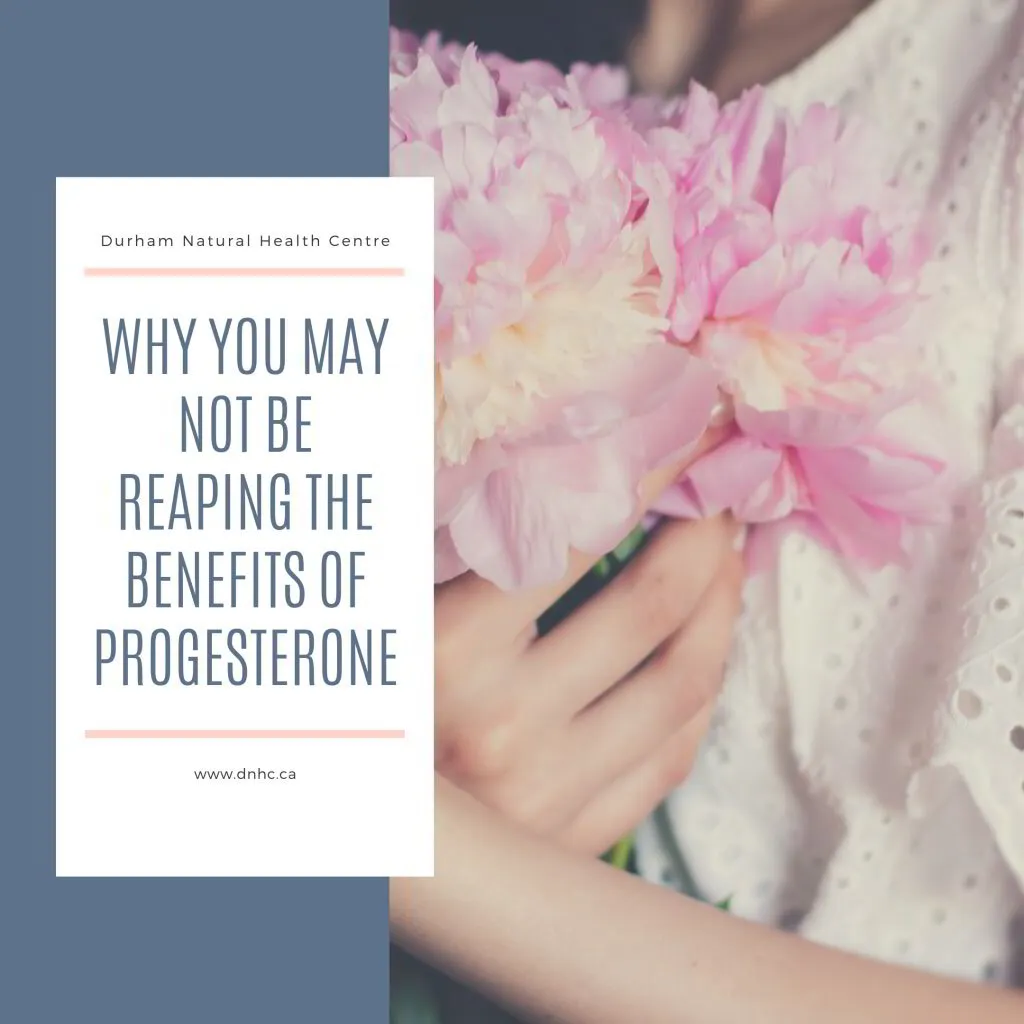Progesterone is a sex hormone that plays a large part in women’s health. Progesterone is the main hormone of the luteral phase, which begins following ovulation (around day 14 of your cycle). When progesterone levels are too low, the body may be unable to support complex processes that occur during menstruation and pregnancy.
Signs of low progesterone levels include:
• Abnormal menstrual periods
• Missed or late periods
• Miscarriage
• Infertility
• Spotting
• Breast tenderness
• Irritability
• Low mood
• Low libido
• Sleep disturbances or insomnia
• Anxiety
• Weight gain
REASONS YOU MIGHT HAVE LOW PROGESTERONE
1) STRESS
Your body will always choose survival over procreation. This means your body will preferentially make cortisol over progesterone when exposed to chronic stress.
Pregnenolone, which is converted into both progesterone and cortisol, among many other hormones, will be shunted to make cortisol at the expense of progesterone in times of stress. This is referred to as the “pregnenolone steal.” Additionally, cortisol blocks progesterone receptors, which means that you cannot efficiently use the progesterone you are making.
2) HYPOTHYROIDISM
Unfortunately, pregnenolone synthesis requires thyroid hormone. To even make the molecule you need to create progesterone, you must first have adequate thyroid hormone.
3) PCOS
Rises in testosterone mean lower levels of progesterone. Making sure you’re producing adequate progesterone is essential in order to ovulate. Without ovulation, not only is it difficult for you to adequately clear the uterine lining during menses, but it is impossible to get pregnant. It is important to understand that even if you’re having a period, it doesn’t mean you’re ovulating. Read more about PCOS here:
https://www.dnhc.ca/2019/10/04/insulin-resistance-and-pcos/ .
4) AGE
After around age 35, we start to see a natural decline in progesterone production. Luckily, there are some ways to support it’s production and hormone balance. Stay tuned!
5) ELEVATED PROLACTIN
Prolactin is a hormone that triggers lactation. However, it can also rise in non-lactating women. This is a problem because high levels of prolactin can interfere with progesterone production and inhibit ovulation. High prolactin levels an be the result of poor diet, stressful lifestyle, and inflammatory conditions. This requires further investigation and consultation with your health care practitioner.
6) ESTROGEN DOMINANCE
Estrogen dominance occurs when a woman produces too much estrogen relative to progesterone. Estrogen dominance can take place during perimenopause or menopause but it is becoming more prevalent amongst women of childbearing age. Excess body fat, chronic stress, and a diet high in sugar and processed foods can contribute to blood sugar imbalance and hormone dysregulation. When progesterone is low due to estrogen dominance, you’ll likely experience other symptoms like fluid retention, breast tenderness and irritability.
HOW TO NATURALLY INCREASE PROGESTERONE
First, it is worth investigating if you have one of the aforementioned conditions such as PCOS, hypothyroidism or estrogen dominance and consult with your health care practitioner to address their root causes.
Otherwise, there are plenty of simple ways to increase progesterone naturally.
1) MANAGE STRESS & SUPPORT THE ADRENALS
As mentioned, chronic stress increases the secretion of cortisol and adrenaline at the expense of sex hormones like progesterone. Consult your holistic health care practitioners to determine stress management techniques that will work for you, whether its deep breathing, mindfulness, or just walking the dog.
Additionally, it is worth supporting your adrenals, the endocrine glands that create your stress hormones as well as a portion of your sex hormones. If these are well conditioned they are more likely to be able to keep up with your body’s demands. Your adrenals particularly love minerals like sodium and magnesium as well as vitamin C. Consult your holistic nutritionist to ensure you’re giving your adrenals the love they need.
Adaptogenic herbs like rhodiola and ashwagandha may also help your adrenals to regulate hormone production. Consider chatting with your naturaopath about your options!
2) DETOX THE LIVER
The liver metabolizes hormones so in order to ensure proper ratios of estrogen and progesterone, support the liver on an ongoing basis.
Along with some herbs & supplements, consider starting with a simple step such as a glass of warm water with lemon every morning or a cup of dandelion tea each day to start stimulating the liver’s detoxification processes.
Speak to your ND and nutritionist about how to support your liver ongoing. We highly recommend our nutritionist’s 10-Day Detox program! Keep an eye out for next time we run that!
3) EAT FOODS THAT WILL SUPPORT PROGESTERONE PRODUCTION
Aside from supporting the adrenals by eating food high in electrolytes and vitamin C, it is also important to ensure that you are providing your body the base nutrients needed to create progesterone.
Cholesterol and essential fatty acids are necessary for the synthesis of pregnenolone, which makes progesterone. Cholesterol is also necessary for the production of thyroid hormone! Consider incorporating more pastured eggs, wild-caught fish and grass-fed beef to your diet.
You may also want to focus on specific nutrients for overall detoxification and hormone balance including compounds like indole-3-carbinol, vitamin B6, and zinc.
Speak with your holistic nutritionist to come up with a focused plan for you!
4) REGULATE YOUR SLEEP
Making sure that you get adequate sleep and at regular times can be an essential step to regulating progesterone production. Ideally, going to sleep between 9-11pm and waking between 6-8am, will assist the adrenals and pituitary gland in the brain to regulate circadian rhythms and the production of progesterone.
Take control of your hormonal health today!
SOURCES
Lieberman, Allan, and Luke Curtis. “In Defense of Progesterone: A Review of the Literature.” Alternative Therapies in Health and Medicine, U.S. National Library of Medicine, Nov. 2017, https://www.ncbi.nlm.nih.gov/pubmed/29055286.
Meenakumari, K J, et al.“Effects of Metformin Treatment on Luteal Phase Progesterone Concentration in Polycystic Ovary Syndrome.” Brazilian Journal of Medical and Biological Research = Revista Brasileira De Pesquisas Medicas e Biologicas, U.S. National Library of Medicine, Nov. 2004, https://www.ncbi.nlm.nih.gov/pubmed/15517078.
Sharaf, A., and N. Gomaa. “Progesterone-like Effect of Vitamins.” SpringerLink, Kluwer Academic Publishers, https://link.springer.com/article/10.1007/BF01105514?LI=truehttp://www.lifeissues.net/writers/feh/feh_15vitamin_c.

